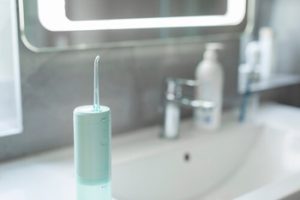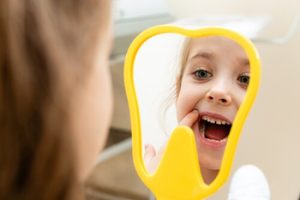When it comes to kids’ dentistry, one tiny mineral packs a big punch in the fight against tooth decay: fluoride. In many oral care products and even in our tap water, fluoride is crucial in building strong, healthy teeth, especially in children. But what does fluoride do? And how can parents ensure their kids get the right amount without going overboard?
In this blog, we’ll explain the science and benefits in a simple, parent-friendly way while highlighting the important role fluoride plays in children’s dental care. From brushing teeth with fluoride toothpaste to understanding professional fluoride treatments, we’ve got you covered.
Curious About Fluoride? Here’s What You Should Know First
Fluoride is a naturally occurring mineral found in rocks, soil, water, and even some foods. Its dental benefits were discovered by chance in the early 20th century when scientists noticed lower rates of dental caries (commonly called cavities) in communities with higher fluoride levels in their drinking water.
Since then, fluoride has become a powerful ally in promoting dental health and preventing tooth decay worldwide.
How Does Fluoride Work to Protect Your Child’s Teeth?
Fluoride strengthens tooth enamel, which is the tooth’s hard outer layer. Here’s how fluoride works in a nutshell:
- Remineralisation: Fluoride helps reverse early tooth decay by restoring minerals that are lost when acids from food and bacteria weaken the enamel.
- Acid Resistance: It makes the enamel more resistant to acid, helping to prevent the formation of cavities.
- Bacterial Control: Fluoride can also inhibit the growth of harmful bacteria in the mouth, minimising the risk of dental caries.
This mineral is especially important for children because their permanent teeth are still developing. Getting enough fluoride during these formative years helps lay the foundation for a lifetime of strong, healthy teeth.
The Importance of Fluoride in Kids’ Dentistry
Fluoride plays a fundamental role in protecting children’s teeth and is a key part of preventive dental care. Dentists often recommend a combination of fluoridated water, fluoride toothpaste, and professional fluoride treatments to protect against dental decay.
Fluoride is particularly beneficial for:
- Children with a high risk of cavities
- Families with limited access to dental care
- Children with special needs or difficulty brushing effectively
- Those with poor diets high in sugar or acid
Fluoride not only protects teeth but also saves families from costly dental procedures down the track.
Brushing With Fluoridated Toothpaste: What Parents Need to Know
Brushing teeth with fluoride toothpaste is one of the simplest and most effective ways to strengthen enamel and prevent cavities.
Here are a few helpful tips:
- For babies: As soon as the first tooth appears, brush using a soft toothbrush and a smear (rice grain size) of low fluoride toothpaste.
- For toddlers (18 months to 6 years): Use a pea-sized amount of fluoride toothpaste, supervise brushing, and ensure your child spits but doesn’t rinse.
- For older children: Encourage twice daily brushing and flossing. Reinforce proper technique to remove plaque and food particles.
Using fluoridated toothpaste regularly helps maintain a steady amount of fluoride in the mouth, protecting the enamel from everyday wear and tear.
What Are Professional Fluoride Treatments?
While brushing and drinking fluoridated water help, professional fluoride treatments provided in a dental office offer an extra layer of protection.
These treatments are gels, foams, or varnishes applied directly to the teeth during a routine checkup. They have a higher fluoride concentration compared to over the counter products and are especially beneficial for children at increased risk of tooth decay.
Your dental professional may recommend these treatments every 3, 6, or 12 months, based on your child’s oral health needs.
Fluoridated Water: A Public Health Success Story
Community water fluoridation is one of the most successful public health initiatives worldwide. In Australia, most public water supplies are fluoridated, helping millions of people, especially children, prevent dental caries with minimal effort.
Here’s why it works so well:
- It benefits everyone who drinks tap water, regardless of age or income
- It’s safe, cost-effective, and backed by decades of research
- It reduces the risk of tooth decay by around 25 per cent in both children and adults
Many respected bodies, including the World Health Organization, the Australian Dental Association, and the National Academies of Sciences, support the practice of adding fluoride to water for its significant benefits to oral health.
What About Fluoride in Food and Supplements?
In some cases, your dentist may suggest fluoride supplements (such as tablets or drops) if your local water supply isn’t fluoridated. These are typically recommended for children who are at high risk of dental decay and not getting enough fluoride from other sources.
Keep in mind: fluoride supplements should only be used under the guidance of a dental or medical professional, as they can contribute to excessive fluoride intake if misused.
Can Kids Get Too Much Fluoride?
Yes, while fluoride is incredibly beneficial in the right amounts, excessive fluoride intake in early childhood can lead to a condition called dental fluorosis. This typically appears as faint white specks or streaks on the teeth and is usually only a cosmetic concern.
It often occurs when young children swallow toothpaste or use too much of it. Here’s how to avoid overexposure:
- Supervise children while brushing
- Use only the recommended amount of toothpaste
- Avoid fluoride supplements unless advised by your dentist
- Ensure your child does not drink excessive amounts of fluoridated water
In very rare cases, extremely high fluoride levels may cause more serious health concerns, such as skeletal fluorosis or increased risk of hip fractures, but these are associated with prolonged exposure to water sources far above recommended safety limits.
How Much Fluoride Do Kids Need?
The Dietary Reference Intakes for fluoride depend on age and exposure:
- Infants (0–6 months): 0.01 mg/day
- Infants (7–12 months): 0.5 mg/day
- Children (1–3 years): 0.7 mg/day
- Children (4–8 years): 1.0 mg/day
- Children (9–13 years): 2.0 mg/day
These values include all sources of drinking water, fluoride toothpaste, mouth rinses, and dietary supplements.
Your dentist can help you assess your child’s fluoride intake and ensure they’re getting the right balance for healthy teeth and overall dental care.
Fluoride Isn’t Just for Kids, Grown-Ups Need It Too!
While this blog focuses on children, it’s worth noting that adults benefit from fluoride just as much. Especially those with:
- Gum recession exposes the tooth roots
- Dry mouth from medications or health conditions
- Frequent snacking or high sugar diets
- A history of dental decay
Whether through fluoride toothpaste, mouth rinses, or professional fluoride treatments, it continues to play a protective role well into adulthood.
Debunking Myths About Fluoride
Let’s clear up some common misconceptions:
Myth 1: Fluoride is dangerous.
Truth: At recommended levels, fluoride is both safe and beneficial. Reputable health organisations support its use in oral health promotion.
Myth 2: You don’t need fluoride if you brush well.
Truth: While brushing and flossing are important, fluoride works by strengthening enamel in a way that brushing alone cannot.
Myth 3: Bottled water is better.
Truth: Most bottled water lacks fluoride. Sticking to tap water may be better for your child’s teeth and your wallet.
Helpful Tips for Parents
- Schedule regular dental checkups for professional fluoride treatments
- Encourage brushing twice daily with fluoridated toothpaste
- Make tap water the drink of choice at home
- Teach children not to swallow toothpaste
- Talk to your dentist about your local water supply and whether fluoride supplements are necessary
Final Thoughts: Fluoride Is a Must-Have in Children’s Dental Care
So, what does fluoride do? It’s a mineral that strengthens enamel, prevents dental caries, and supports long-term dental health, especially in growing children. It is a quiet hero in kids’ dentistry, helping prevent early decay before it even starts.
From fluoridated water to fluoride toothpaste and dental office treatments, incorporating fluoride into your child’s daily routine is a smart and simple way to ensure a healthy smile that lasts a lifetime.
If you’re unsure whether your child could benefit from fluoride treatment, book an appointment with Available Dental Care at (02) 4062 8763 or (02) 4628 0573. Our experienced team will assess your child’s specific needs and recommend the most effective fluoride care to help strengthen and protect developing teeth.
References
- Cleveland Clinic. (n.d.). Fluoride treatment. Retrieved from https://my.clevelandclinic.org/health/treatments/11195-fluoride
- Centers for Disease Control and Prevention. (n.d.). About dental fluorosis. Retrieved from https://www.cdc.gov/oral-health/about/about-dental-fluorosis.html
- Australian Dental Association. (n.d.). Home. Retrieved from https://ada.org.au/
- Wang, Y., Zhang, X., & Liu, H. (2023). Fluoride exposure and health effects: A review of recent studies. Environmental Research, 223, 115439. https://doi.org/10.1016/j.envres.2023.115439




